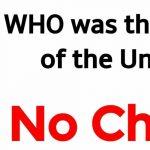Are you at least as smart as a 4th grader?Only 3% Of American Adults Can Pass This 4th Grade Geography Test
Quiz: 7% Of American Adults Pass This 4th Grade Geography Test
Are you curious about whether you have hidden witch powers? Do you feel like you have a special connection to the universe or a sixth sense that others don't seem to possess? If so, then this quiz is for you!
Our quiz is designed to help you discover whether you have any hidden witch powers. We'll ask you a series of questions about your personality, beliefs, and experiences to determine whether you have any magical abilities.
Some of the questions we'll ask include whether you believe in the power of crystals, whether you've ever had a premonition or psychic experience, and whether you feel drawn to certain elements like fire or water.
By the end of the quiz, you'll have a better understanding of whether you have any hidden witch powers and what those powers might be. Whether you're a seasoned witch or just starting to explore your spiritual side, this quiz is a fun and informative way to learn more about yourself and your abilities.
So, are you ready to find out if you have hidden witch powers? Take our quiz now and discover your magical potential!





